Thinking about doing a BBA (Bachelor of Business Administration)? Great choice! It’s one of the most popular courses for students who want to build a career in business, management, or even start their own venture. But before you dive in, there’s one big question to answer — what are the BBA course fees like in India?
Understanding BBA course fees is super important because it helps you plan your education budget better. From tuition charges to hostel accommodation, books, uniforms, and even day-to-day expenses — everything adds up. And with so many options like government colleges, private universities, and even online BBA programs, the fee structure can vary a lot.
In this blog, we’ll break it all down for you. We’ll talk about the average BBA course fees in India, compare top colleges, uncover hidden costs, and even explore scholarships and education loan options. By the end, you’ll have a clear picture of what to expect — and how to choose the best BBA program that fits your budget.
Let’s get started!
Average BBA Course Fees in India (Govt vs Private)
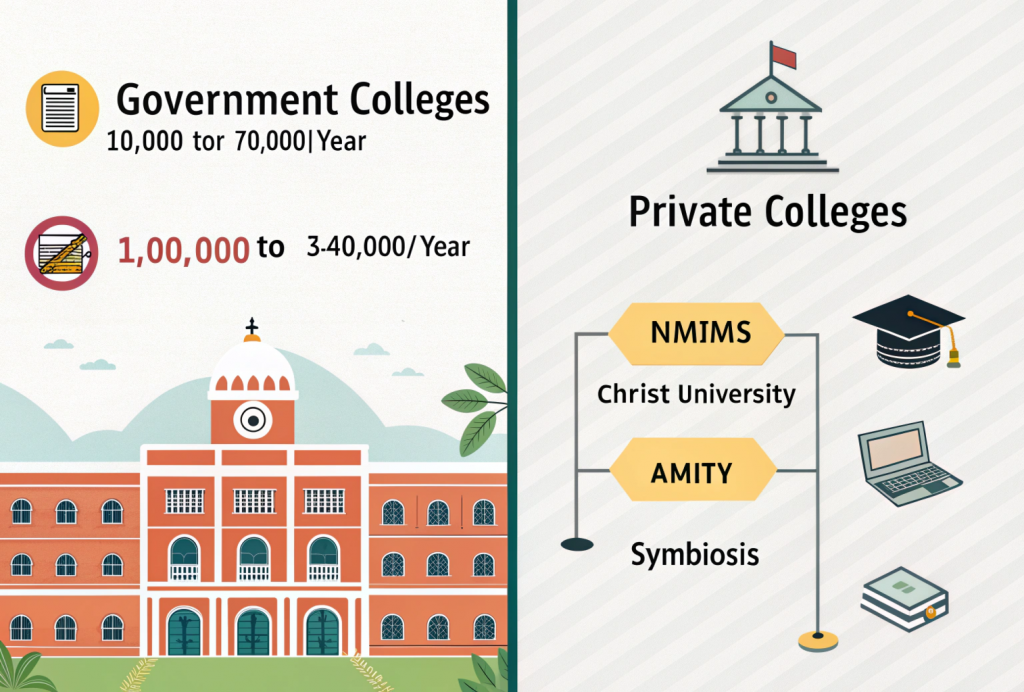
One of the biggest factors while choosing a BBA program is the cost, and it really depends on the type of college you pick — government or private. Let’s break it down in a simple way.
Government Colleges
Government colleges are usually much more affordable because they’re funded by the government. They offer quality education at a lower cost, which is why they’re in high demand.
- Average fees: ₹10,000 to ₹70,000 per year
- Total cost for 3 years: Around ₹30,000 to ₹2,00,000
- Popular examples: Delhi University, Jamia Millia Islamia, BHU
Getting into these colleges can be competitive, but if you’re looking for a solid education without spending too much, they’re a great option.
Private Colleges
Private colleges, on the other hand, tend to charge higher fees. They often provide modern infrastructure, updated course material, better placement support, and more extra-curricular opportunities.
- Average fees: ₹1,00,000 to ₹3,00,000 per year
- Total cost for 3 years: Around ₹3,00,000 to ₹9,00,000
- Popular examples: NMIMS, Christ University, Amity, Symbiosis
While these colleges can be more expensive, many students choose them for the overall exposure, learning environment, and career opportunities. It’s a good idea to compare what each college offers beyond just the fee — such as faculty quality, internships, placements, and campus facilities — to find the best fit for your goals and budget.
Online vs Regular BBA Fee Comparison
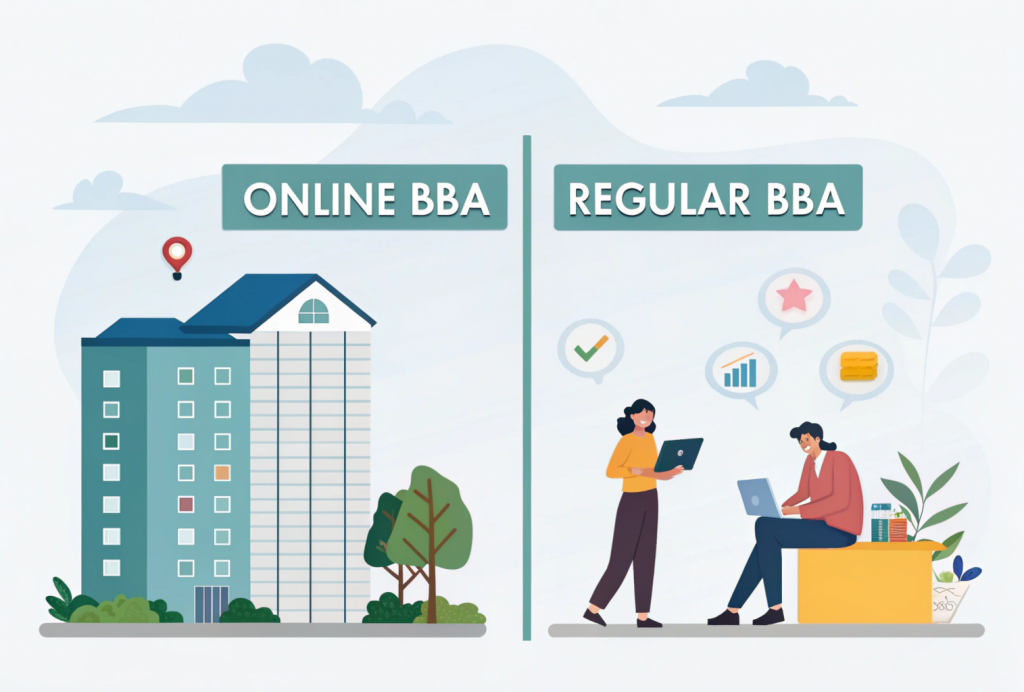
With the rise of digital education, many students are now exploring online BBA programs as an alternative to the traditional classroom-based BBA. But when it comes to fees, there’s a big difference between the two.
Online BBA
Online BBA programs are much more affordable because there’s no cost for campus facilities, hostel, or physical infrastructure. They’re ideal for students who want flexibility and want to save money without compromising on getting a valid degree.
- Average fees: ₹30,000 to ₹1,00,000 per year
- Total cost for 3 years: Around ₹90,000 to ₹2,50,000
- Offered by: Online campuses of universities like Shoolini Online, Amity Online, Manipal University Online, LPU Online, Jain Online
These programs are UGC-approved and suitable for students who may be working part-time, staying in remote areas, or looking to avoid relocation costs.
Regular BBA (On-Campus)
Traditional BBA programs are delivered in physical classrooms with access to labs, libraries, events, and in-person interactions. But that also means higher costs due to campus facilities, hostel, and day-to-day expenses.
- Average fees: ₹1,00,000 to ₹3,00,000 per year
- Total cost for 3 years: Around ₹3,00,000 to ₹9,00,000
- Offered by: Colleges like Christ University, Symbiosis, NMIMS, DU-affiliated colleges
These programs offer a more immersive experience and better networking opportunities — but they’re costlier and may require you to move to another city.
Which One to Choose?
If you’re looking for a budget-friendly and flexible option, online BBA might be a smart choice. But if you prefer in-person learning and a full campus experience, then a regular BBA is worth considering — provided it fits your budget.
Explore our online programs to become future-ready
Transform your career with industry-aligned courses designed by experts.
View All CoursesAdditional Costs: Hostel, Books, Uniform, etc.
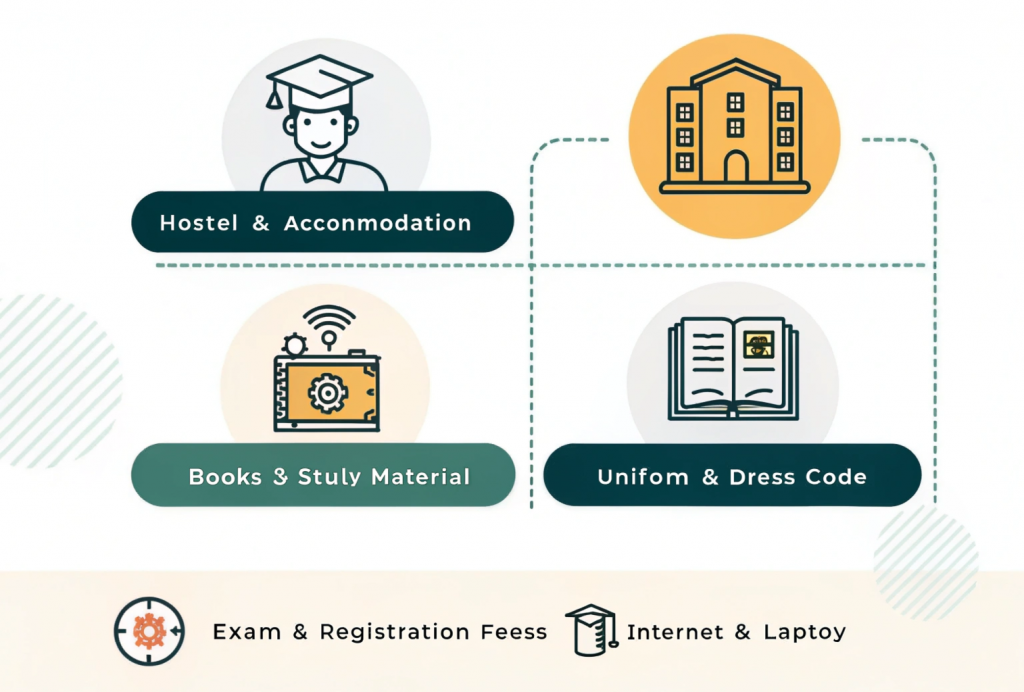
When planning for a BBA degree, most students and parents focus only on the tuition fees. But there are a bunch of other costs that can quietly add up. Knowing about these extra expenses in advance can help you plan your budget better.
| Cost Category | Estimated Range | Remarks |
|---|---|---|
| Hostel & Accommodation | Govt: ₹30,000–₹60,000/year Private: ₹60,000–₹1,50,000/year |
Costs vary based on facilities, location, and whether food is included. |
| Books & Study Material | ₹3,000–₹8,000/year | Includes textbooks, stationery, and online learning material access. |
| Uniform & Dress Code | ₹2,000–₹5,000 (one-time) | Only applicable in colleges with formal dress codes or business presentations. |
| Exam & Registration Fees | ₹1,000–₹5,000/year | May include semester exams, university enrollment, and certification charges. |
| Internet & Laptop | Laptop: ₹25,000–₹50,000 (one-time) Internet: ₹500–₹1,000/month |
Essential for online BBA students; covers classes, exams, and assignments. |
Scholarship Options & Government Support
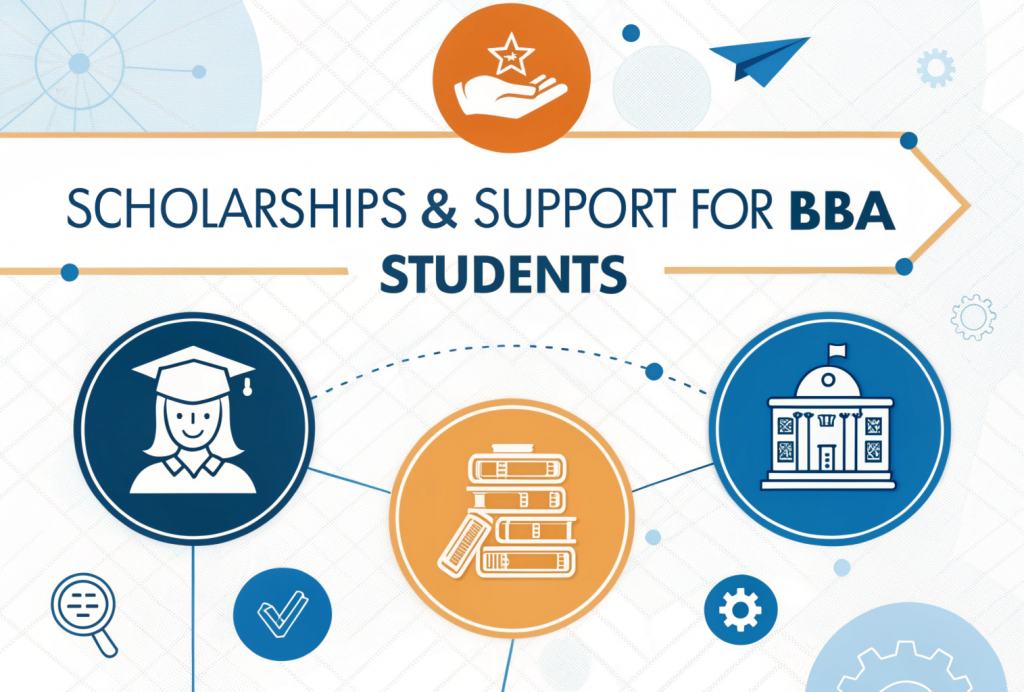
Worried about how to manage the cost of your BBA? Don’t stress too much — there are plenty of scholarships and government schemes that can help ease the financial burden. You just need to know where to look and how to apply.
- College-Specific Scholarships
Many private and even some government colleges offer their own merit-based or need-based scholarships.
- Merit-based: Given to students with high marks in 12th grade or entrance exams.
- Need-based: For students from economically weaker backgrounds.
- Some colleges also offer early bird discounts or fee waivers for top performers in the first year.
Tip: Always check the scholarship section on the college’s official website before applying.
- Central Government Schemes
The Indian government provides several national-level scholarships through platforms like the National Scholarship Portal (NSP):
- Post Matric Scholarship for OBC/SC/ST students
- Merit-cum-Means Scholarship for Minority Students
- Central Sector Scholarship for College & University Students
These are usually based on family income and academic performance. You’ll need to apply online and upload documents like income certificates and mark sheets.
- State Government Scholarships
Almost every state in India has its own scholarship schemes for students who are residents of that state.
For example:
- Himachal Pradesh offers scholarships to girls, economically weaker students, and students from tribal areas.
- Maharashtra, UP, Rajasthan, and others have similar schemes with different eligibility rules.
You can usually apply for these through your state’s education portal.
- Scholarships for Girls
Some colleges and NGOs offer special scholarships only for female students to promote higher education among girls. These can cover part or full tuition fees.
- Private & NGO Scholarships
There are also private organizations and NGOs that offer financial support to deserving students.
Popular ones include:
- Sitaram Jindal Foundation Scholarship
- HDFC Educational Crisis Scholarship
- Aditya Birla Scholarship
These usually require an application form, basic documents, and sometimes a short interview or essay.
Education Loans for BBA
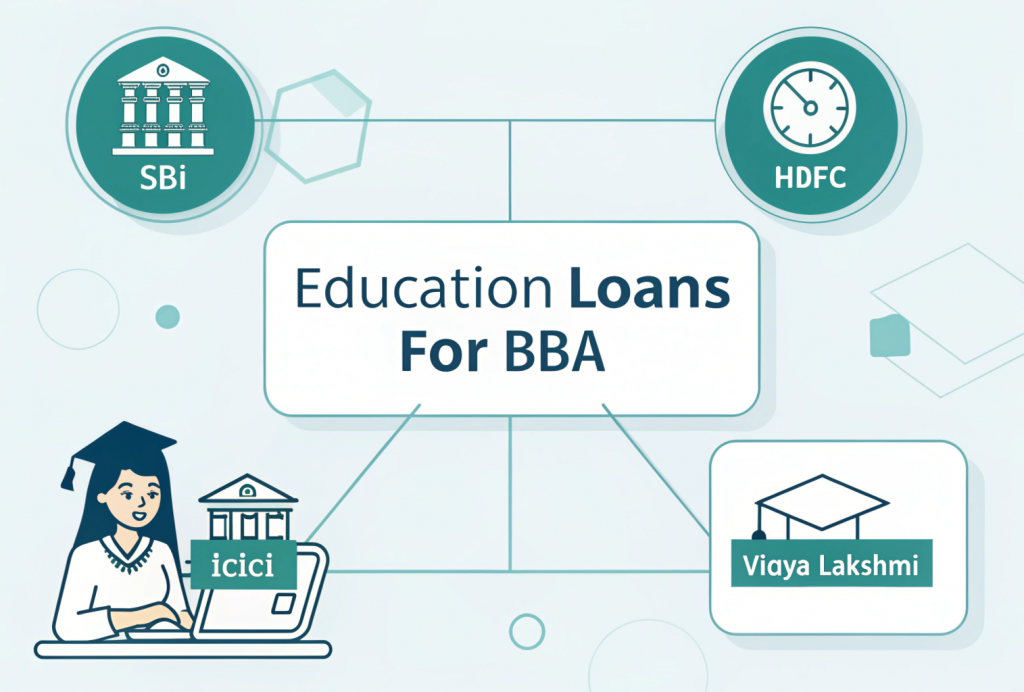
If you’re worried about how to pay for your BBA course, an education loan can be a helpful option. Many banks and financial institutions in India offer student loans specifically for undergraduate programs like BBA — and the best part is, you don’t need to start repaying immediately.
Here’s how it works in simple terms.
- Who Can Apply?
- Indian students who have secured admission in a recognized college or university (online or regular).
- The student is the main applicant, but a parent or guardian acts as a co-applicant.
- Some banks may ask for collateral if the loan amount is high (usually above ₹7.5 lakh).
- What Expenses Are Covered?
Education loans usually cover more than just your tuition fees. They can include:
- Tuition and admission fees
- Hostel and mess charges
- Cost of books, laptop, uniform, etc.
- Travel expenses (if applicable)
- How Much Loan Can You Get?
- For BBA courses, banks typically offer loans ranging from ₹50,000 to ₹10 lakh.
- Exact loan amount depends on the course fees, your academic profile, and the college you’re joining.
- Repayment Terms
- You get a moratorium period, which means you start repaying the loan after the course ends (plus 6 to 12 months, depending on the bank).
- Loan repayment tenure usually ranges from 5 to 15 years.
- Interest Rates
- Most public banks offer education loans at an interest rate of 8% to 11%, which may vary slightly.
- Female students often get a small interest rate discount (about 0.5%).
- Where to Apply
You can apply for education loans through:
- Public banks like SBI, Punjab National Bank, Bank of Baroda
- Private banks like HDFC, ICICI, Axis Bank
- NBFCs and platforms like Credila, Avanse, and InCred
- Online portals like Vidya Lakshmi (central government loan portal)
Before applying, make sure to compare interest rates, repayment terms, and processing fees. Also, check if your college has any tie-ups with banks for faster approval.
Conclusion
Choosing the right BBA program isn’t just about picking a college — it’s also about understanding the full cost involved and planning your finances smartly. From tuition fees and hostel charges to books, uniforms, and even internet costs (for online courses), there’s more to the fee structure than meets the eye.
Whether you go for a government college, a private university, or an online BBA, each option has its own cost and benefits. Thankfully, there are scholarships, government support, and education loans available to help reduce the financial burden.
At the end of the day, the goal is to find a program that not only fits your budget but also gives you good value for money — in terms of education quality, placement support, and overall experience.
So, take your time, do your research, compare all options, and make a choice that works best for your goals and your pocket.


Leave a Reply